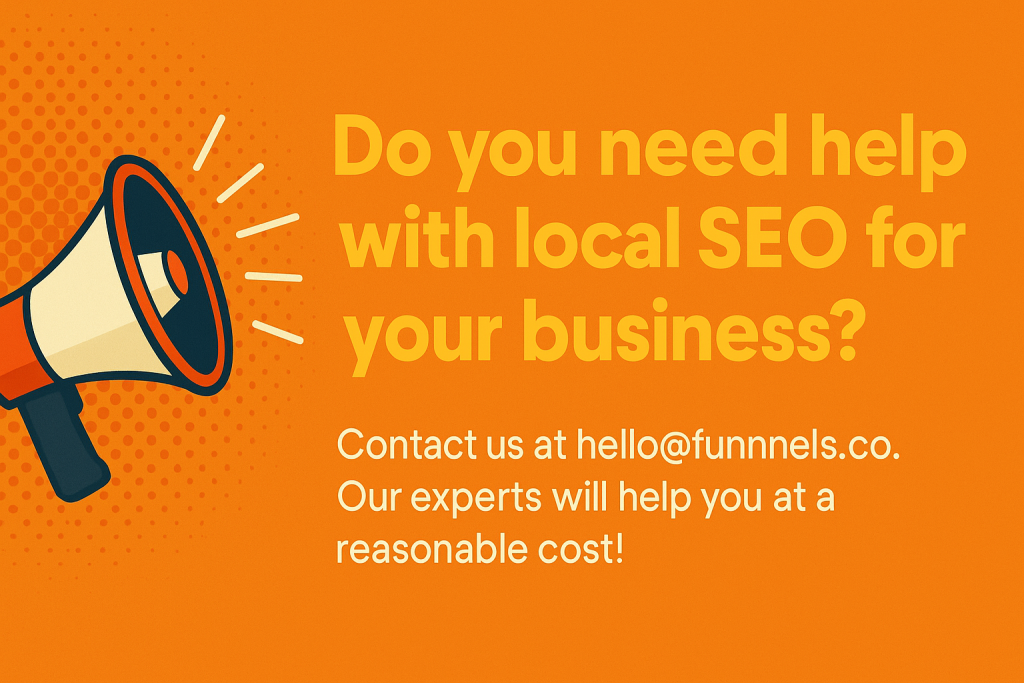Introduction
If you’re a small business owner wondering how to get more local customers through Google, you’re in the right place. Local SEO helps your business appear in search results when people nearby are looking for what you offer — whether it’s a barber shop, cafe, tuition center, or digital agency.
In this guide, you’ll learn how to do local SEO step by step — even if you’re not a tech expert.
What Is Local SEO?
Local SEO (Local Search Engine Optimization) is the process of optimizing your online presence to attract more business from relevant local searches on Google and other search engines.
These searches often include:
- “near me” (e.g., cafe near me)
- city names (e.g., best digital marketing agency in Kuala Lumpur)
If done correctly, local SEO helps your business show up on:
- Google Maps
- Google 3-Pack (the top 3 local listings on Google)
- Organic search results
Why Local SEO Matters
- 46% of all Google searches are looking for local information.
- 88% of consumers who search for a local business on mobile visit or call a business within 24 hours.
- Local SEO drives real customers who are already searching for your service.
How to Do Local SEO (Step-by-Step)
1. Create and Optimize Your Google Business Profile
Your Google Business Profile (formerly Google My Business) is your most powerful local SEO tool.
Steps:
- Go to google.com/business
- Claim or create your business
- Fill out ALL information: name, address, phone, website, hours, category
- Add high-quality photos
- Use keywords in your description
- Post updates regularly
Example: A bakery in Penang could write:
“We are a Penang-based bakery specializing in fresh sourdough, cupcakes, and wedding cakes.”
2. Use Local Keywords on Your Website
Include location-based keywords naturally in your content, such as:
- Homepage
- Service pages
- Title tags and meta descriptions
- Image alt text
- Blog posts
📌 Example Keywords:
- “cafe in Subang Jaya”
- “hair salon near Bangsar”
- “digital marketing consultant in KL”
Use free tools like Ubersuggest or Google Keyword Planner to find keyword variations.
3. Get Listed in Online Directories (Citations)
Citations are mentions of your business on other sites. They boost trust and help search engines verify your info.
📍List your business on:
- Yelp
- Yellow Pages Malaysia
- Foursquare
- Bing Places
- Hotfrog
- Facebook Business Page
⚠️ Make sure your NAP (Name, Address, Phone Number) is consistent across all listings.
4. Encourage Customer Reviews (and Respond!)
Reviews help you rank better and build trust.
✅ Ask happy customers to leave Google reviews
✅ Respond to every review — positive or negative
✅ Use review keywords: “Thank you for your review on our cafe in Petaling Jaya!”
5. Optimize Your Website for Mobile
Most local searches happen on smartphones. Ensure:
- Your site loads fast
- It’s easy to read on small screens
- Your phone number is clickable
- Google Maps is embedded
Use Google’s Mobile-Friendly Test to check.
6. Add Location Pages (If You Have Multiple Branches)
Each branch should have its own location page with:
- Address
- Business hours
- Embedded map
- Testimonials
- Local keywords
📌 Example: funnnnels.academy/penang-workshop
7. Create Locally-Relevant Content
Blog about:
- Local events you sponsor
- Community news
- Local industry tips
- “Best of” lists in your area
This shows relevance to your community and gives Google more context.
8. Build Local Backlinks
Backlinks are links from other websites to yours. Local backlinks from your community signal authority.
🎯 Try:
- Joining the local chamber of commerce
- Partnering with nearby businesses
- Getting featured in local news or blogs
Final Thoughts
If you’ve ever wondered how to do local SEO, now you have a step-by-step game plan. Start with your Google Business Profile, optimize your website for local keywords, and focus on reviews and local backlinks. Even simple changes can help your business appear right when someone is searching nearby.
Typically 1–3 months for small improvements. Ranking in the top 3 may take longer depending on competition.
It’s highly recommended, but not mandatory. A well-optimized Google Business Profile can still bring traffic.
Yes! Most local SEO tactics cost time, not money.

Leave a Reply